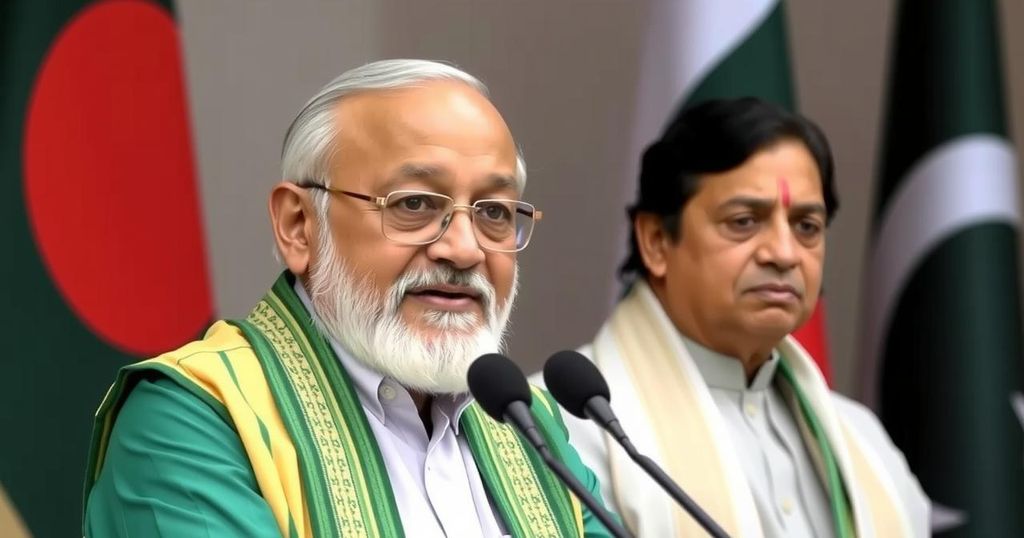Bangladesh’s interim leader Muhammad Yunus and Pakistan’s PM Shehbaz Sharif met during the D-8 Summit in Cairo. Yunus emphasized the need to resolve ongoing issues dating back to the 1971 separation of the two nations. This meeting reflects a potential shift in Bangladesh’s foreign relations, particularly amid strained ties with India. Both leaders discussed enhancing cooperation in various sectors to promote mutual development.
In a significant diplomatic movement, Bangladesh’s interim leader, Muhammad Yunus, met with Pakistan’s Prime Minister, Shehbaz Sharif, during the 11th D-8 Summit held in Cairo, Egypt. This meeting signifies a potential shift in Bangladesh’s foreign relations, particularly in response to its previously strained ties with India. Yunus expressed his intentions to address historical grievances stemming from the 1971 separation between the two nations, emphasizing the need to resolve these issues to facilitate mutual progress.
Following their discussions, Yunus highlighted that unresolved matters dating back to the formation of Bangladesh remain obstacles that both countries must address. His visit and dialogue with Sharif signify an opportunity for both nations to enhance bilateral relations and explore areas for cooperation, including trade, cultural exchange, and technology.
The background of this developing diplomatic context is rooted in the turbulent history shared by Pakistan and Bangladesh. Following their separation in 1971, which was largely influenced by political and social tensions, Bangladesh fostered closer ties with India. In recent times, following Yunus’ leadership emergence, a noticeable shift has occurred, with new Bangladeshi leadership appearing less favorable towards India, particularly as the incumbent leader, Sheikh Hasina, has maintained strong ties with New Delhi.
In a statement on social media, Prime Minister Sharif articulated, “Had a very warm and cordial exchange with my friend Prof. Dr. Muhammad Yunus, Chief Adviser of Bangladesh…We discussed strengthening historical and cultural ties, increasing trade, and exploring cooperation in IT, chemicals, leather, surgical goods and other sectors…” This statement underscores the efforts by both leaders to foster a spirit of collaboration and mutual development between their nations.
The statement from Yunus’ office indicated his commitment to tackling the longstanding issues that have hindered progress between Bangladesh and Pakistan. His proactive approach aims to create a foundation for improved relations and growth moving forward.
Bangladesh and Pakistan share a complex and challenging history, having been united as one nation until their separation in 1971 due to a civil war and subsequent independence of Bangladesh. This historical division has contributed to ongoing tensions between the two countries, particularly as Bangladesh has, over the decades, aligned more closely with India. The meeting between Muhammad Yunus and Shehbaz Sharif at the D-8 Summit indicates a willingness from both parties to explore reconciliation and pragmatic solutions to longstanding disputes.
The recent meeting between Muhammad Yunus and Shehbaz Sharif at the D-8 Summit represents a pivotal moment in Bangladesh-Pakistan relations. Yunus’s commitment to resolving historical disputes, combined with Sharif’s openness towards strengthening ties, may herald a new chapter in bilateral cooperation. As the geopolitical landscape shifts, both nations appear poised to work towards shared prosperity and mutual respect, overlooking past grievances for future collaboration.
Original Source: www.india.com







